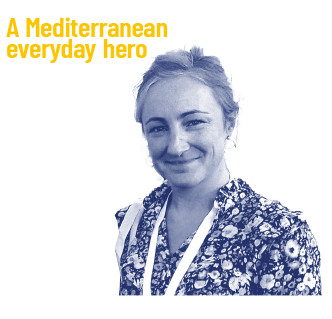
Unemployment
High unemployment rates, particularly among the youth, pose a significant challenge in the Mediterranean region, affecting economic growth and societal stability. It’s imperative we invest in education and job creation, notably the link between them, to offer the next generation hope and opportunities.
Astrid Desjobert
In a sunlit classroom in Tunisia, Italy or France, the air buzzes with excitement and possibility. Over there, groups of young adults gather, their faces alight with hope as they embark on a journey toward a brighter future. These individuals are part of the Mediterranean New Chance (MedNC), a transformative initiative aimed at integrating young people who are not in education, employment, or training (NEET) into the socio-professional fabric of society.
The MedNC Network, spearheaded by the Institut Européen de Coopération et de Développement (IECD), spans across Algeria, Egypt, France, Italy, Jordan, Lebanon, Morocco, Portugal, Spain, and Tunisia. The network comprises 18 vocational training organizations that implement effective solutions to tackle youth unemployment and socio-professional exclusion. The MedNC network fosters the exchange of innovative educational practices across the Mediterranean region. The project rests on three pillars: uniting stakeholders for socio-professional integration, promoting capacity-building, and enhancing opportunities for NEETs through advocacy work, particularly young women.
Leading the charge is the passionate Director of Operations, Astrid Desjobert, whose career has been a testament to her dedication to educational reform and youth empowerment. “I’ve worked in the development sector with a Mediterranean focus for nine years, addressing educational challenges and the skill gaps among young people,” she shares. Her journey from the private sector to the NGO that drives MedNC has been fueled by a desire to tackle the root causes of educational disparities.

“It felt like opening Pandora’s box when I realized that millions of young people in the Mediterranean were already desperate at 15 or 17 years old.” You could hear the emotion in Astrid’s voice. “That’s when I said to myself that no, this wasn’t possible. Looking back on my student experience, it felt easy, there was a lot of hope for the future. How is this fair?” That is when Astrid said to herself that she had to do something to help righting wrongs.
Her encounters with young people across the Mediterranean have deeply influenced her. “Meeting these young people, who face numerous challenges—from lack of guidance and employment prospects to environmental degradation—has been a profound experience. It’s clear the system is failing them, not the other way around,” she explains. The statistics are stark, with almost 1 in 3 youths aged 15-24 in North Africa categorized as NEETs. Over in Spain, young people under 29 without education nor employment fall short of 1 million. Yet, it is witnessing the transformation in these young lives that keeps her motivated. “Seeing the stars in their eyes and hearing how the project has changed their lives is incredibly rewarding.”
One poignant memory she recalls is a theater performance by the students, depicting how the second-chance schools have changed their lives. “They performed in front of officials, school staff, and families. It was a powerful moment of connection and pride,” she says. Another significant milestone was the launch of the first second-chance school in Sousse, after five years of dedicated effort. “Hearing the youths express their gratitude was a moment of immense fulfillment.”
MedNC’s impact is multifaceted, addressing not only the educational needs but also the systemic challenges. By working closely with governments and local actors, the project creates sustainable frameworks and policies, as seen in Tunisia. It also empowers local educators through innovative training programs, such as the recently developed ‘MedNGreen’ pedagogical toolbox, which focuses on sustainable practices and environmental awareness in the Mediterranean. This toolbox is the steppingstone of a major shift striving to place these young people at the center of tomorrow’s solutions towards sustainable societies. Astrid and her team recognized a glaring gap—disengaged youth were being left out of major innovations and global challenges, particularly in digital and environmental sectors.
For these young individuals, the lack of digital skills is a significant barrier. Without these competencies, applying for jobs, attending interviews, and pursuing training in digital professions becomes nearly impossible. The environmental sector presents similar challenges. Understanding environmental issues and training for green jobs are crucial, yet these young people are often deemed incapable of entering such innovative fields. Thus, MedNGreen is an effective tool for educators to change this perception.
Despite the challenges, such as limited resources and the vast scope of the problem, the project’s collaborative approach sustains their efforts. “It’s this collaboration that keeps us motivated. Seeing others in different countries facing similar issues and not giving up creates a strong, supportive network across 10 countries,” she reflects.
As the MedNC project continues to expand, its future looks promising. With aspirations to replicate successful models and initiate dialogues with more countries, the goal is clear: to provide ample integration solutions for all NEETs, focusing on future-ready fields.
In the words of Astrid Desjobert, “This project is about more than just education; it’s about restoring dignity and hope to a generation of young people, empowering them to dream and build a future they can be proud of.”
About the Mediterranean New Chance network
- MedNC has proven the significance of its work by providing support to over 4000 professionals working with 55,000 young people across 10 Mediterranean countries: Algeria, Egypt, France, Italy, Jordan, Lebanon, Morocco, Portugal, Spain and Tunisia.
- MedNC Policy Brief: Addressing the NEET emergency in the Mediterranean
- Web series: check out the videos of MedNC in France, Morocco and Tunisia.